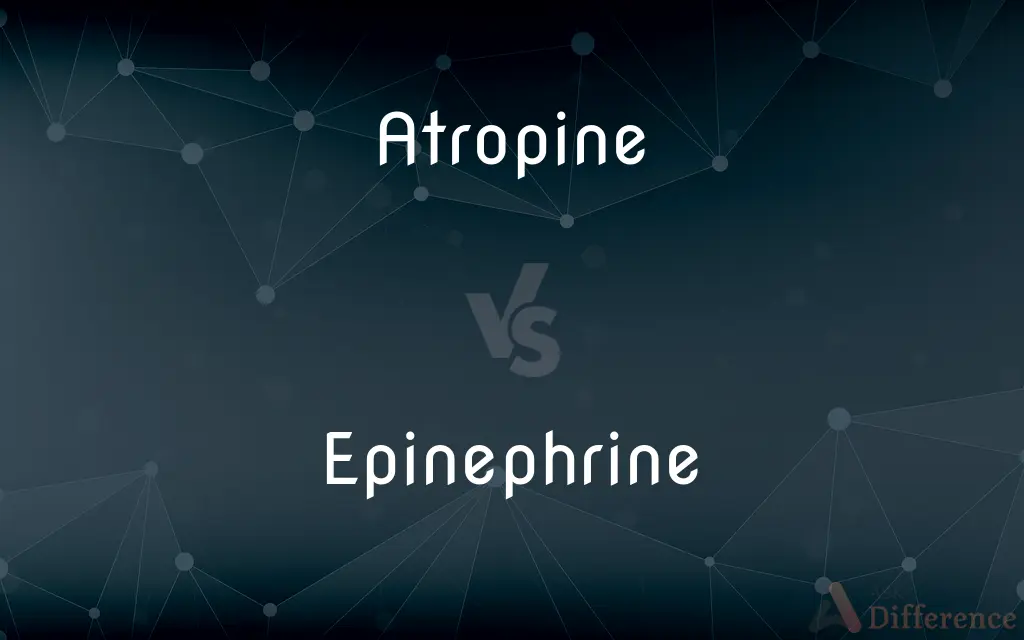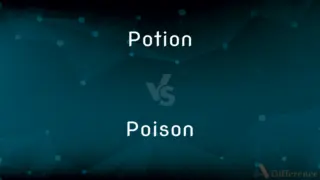Atropine vs. Epinephrine — What's the Difference?
By Tayyaba Rehman — Updated on October 31, 2023
Atropine is an anticholinergic drug; Epinephrine is an adrenergic agonist used in emergencies.

Difference Between Atropine and Epinephrine
Table of Contents
ADVERTISEMENT
Key Differences
Atropine is an anticholinergic, blocking acetylcholine receptors. Epinephrine acts as an adrenergic agonist, stimulating adrenaline receptors.
Atropine is used to treat bradycardia and in anesthesia to reduce secretions. Epinephrine is essential in treating anaphylaxis and cardiac arrest.
Atropine is sourced from deadly nightshade and other Solanaceae plants. Epinephrine also known as adrenaline, it’s a natural hormone and neurotransmitter.
Atropine can cause dry mouth, blurred vision, and increased heart rate. Epinephrine may lead to increased heart rate, anxiety, and tremors.
Atropine is not typically used in allergic reactions or asthma. Epinephrine is widely used in emergency allergic reactions and asthma attacks.
ADVERTISEMENT
Comparison Chart
Classification
Anticholinergic drug.
Adrenergic agonist.
Primary Use
Treats bradycardia, reduces secretions.
Treats anaphylaxis, cardiac arrest.
Source
Derived from certain plants.
Natural hormone, also synthetically produced.
Side Effects
Dry mouth, blurred vision, tachycardia.
Increased heart rate, anxiety, tremors.
Usage in Allergies
Not typically used.
Commonly used in allergic reactions.
Compare with Definitions
Atropine
Secretion Reducer:
Atropine reduces saliva during surgery.
Epinephrine
Anaphylaxis Treatment:
Epinephrine is crucial for severe allergy reactions.
Atropine
Plant-Derived:
Atropine is obtained from deadly nightshade.
Epinephrine
Vasoconstrictor:
Epinephrine constricts blood vessels to control bleeding.
Atropine
Antidote for Poisoning:
Atropine counters organophosphate poisoning.
Epinephrine
Cardiac Stimulant:
Epinephrine is administered during cardiac arrest.
Atropine
Anticholinergic Agent:
Atropine is used to reverse bradycardia.
Epinephrine
Adrenaline Synonym:
Epinephrine is also known as adrenaline.
Atropine
Pupil Dilator:
Atropine dilates pupils for eye exams.
Epinephrine
Asthma Relief:
Epinephrine helps in acute asthma attacks.
Atropine
Atropine is a tropane alkaloid and anticholinergic medication used to treat certain types of nerve agent and pesticide poisonings as well as some types of slow heart rate, and to decrease saliva production during surgery. It is typically given intravenously or by injection into a muscle.
Epinephrine
A hormone secreted by the adrenal medulla that is released into the bloodstream in response to physical or mental stress, as from fear or injury. It initiates many bodily responses, including the stimulation of heart action and an increase in blood pressure, metabolic rate, and blood glucose concentration. Also called adrenaline.
Atropine
A poisonous, bitter, crystalline alkaloid, C17H23NO3, obtained from belladonna and other related plants. It is used to dilate the pupils of the eyes and as an antispasmodic.
Epinephrine
A white to brownish crystalline compound, C9H13NO3, isolated from the adrenal glands of certain mammals or synthesized and used in medicine as a heart stimulant, vasoconstrictor, and bronchial relaxant.
Atropine
An alkaloid extracted from the plant deadly nightshade (Atropa belladonna) and other sources, such as the seeds of the thorn-apple. Though overdoses would be fatal it is used as a drug in medicine for its paralytic effects (e.g. in surgery to relax muscles, in dentistry to dry the mouth, in ophthalmology to dilate the pupils).
Epinephrine
(medicine) A catecholamine hormone and neurotransmitter; as a hormone, secreted by the adrenal gland in response to stress (when it stimulates the autonomic nervous system); as a neurotransmitter, synthesized from norepinephrine. It is also used as a medication.
Atropine
A poisonous, white, crystallizable alkaloid, extracted from the Atropa belladonna, or deadly nightshade, and the Datura Stramonium, or thorn apple. It is remarkable for its power in dilating the pupil of the eye. Called also daturine.
Epinephrine
A catecholamine secreted by the adrenal medulla in response to stress (trade name Adrenalin); stimulates autonomic nerve action
Atropine
A poisonous crystalline alkaloid extracted from the nightshade family; used as an antispasmodic and to dilate the eye pupil; also administered in large amounts as an antidote for organophosphate nerve agents or organophosphate insecticides
Common Curiosities
Can atropine be used for allergic reactions?
Atropine is generally not used for allergic reactions; epinephrine is preferred.
What are the common side effects of epinephrine?
Epinephrine can cause increased heart rate, tremors, and anxiety.
How does atropine affect the heart?
Atropine increases heart rate by blocking the action of acetylcholine.
Can atropine be used in eye exams?
Yes, atropine is used to dilate pupils during eye exams.
What are the main uses of epinephrine?
Epinephrine is used in anaphylaxis, cardiac arrest, and as a vasoconstrictor in local anesthesia.
Is epinephrine effective in cardiac arrest?
Yes, epinephrine is a critical drug in the management of cardiac arrest.
What is atropine primarily used for?
Atropine is used to treat bradycardia and as a preanesthetic to reduce secretions.
Is atropine an antidote for certain poisons?
Atropine is an antidote for poisoning by organophosphates and other cholinergic substances.
What is the role of epinephrine in asthma?
Epinephrine relaxes the muscles in the airways, providing relief in asthma attacks.
Can epinephrine be produced synthetically?
Yes, epinephrine can be synthesized for medical use.
Is epinephrine a natural substance?
Yes, epinephrine (adrenaline) is a natural hormone and neurotransmitter.
Can epinephrine be selfadministered?
Yes, epinephrine autoinjectors are used for selfadministration in emergencies.
What is the effect of atropine on the eyes?
Atropine causes pupil dilation and can temporarily impair near vision.
What should be monitored when using atropine?
Heart rate and ocular pressure should be monitored when using atropine.
Are there contraindications for using atropine or epinephrine?
Both drugs have contraindications; for instance, atropine should be used cautiously in glaucoma, and epinephrine should be used carefully in patients with heart disease.
Share Your Discovery

Previous Comparison
Potion vs. Poison
Next Comparison
Intelligence vs. BrillianceAuthor Spotlight
Written by
Tayyaba RehmanTayyaba Rehman is a distinguished writer, currently serving as a primary contributor to askdifference.com. As a researcher in semantics and etymology, Tayyaba's passion for the complexity of languages and their distinctions has found a perfect home on the platform. Tayyaba delves into the intricacies of language, distinguishing between commonly confused words and phrases, thereby providing clarity for readers worldwide.














































